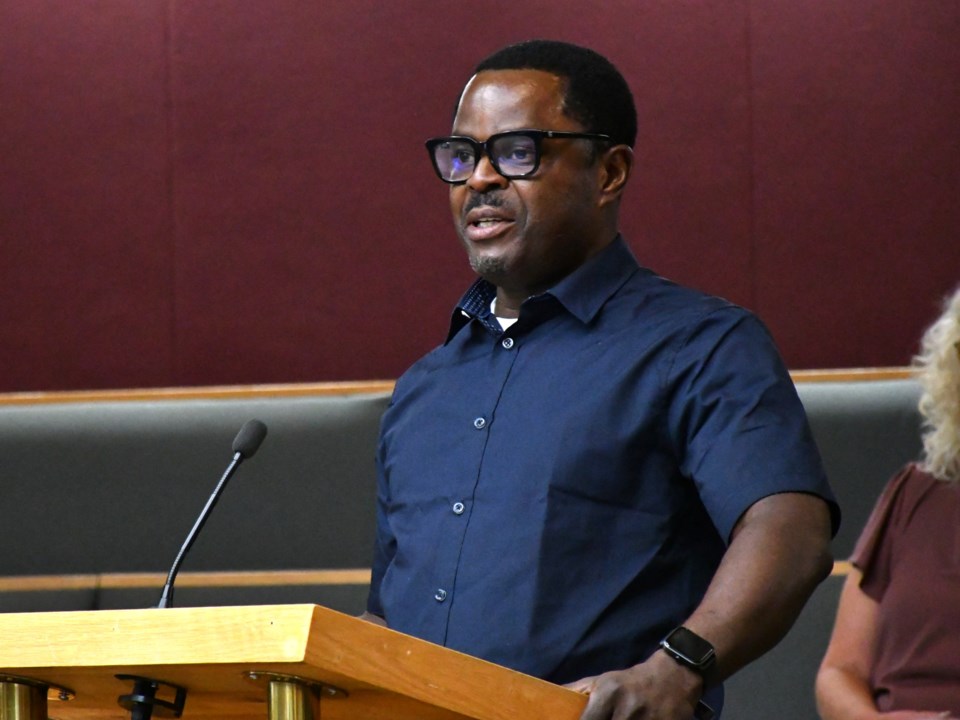MOOSE JAW — When Godwin Ezizor was campaigning to become a city councillor during the 2024 municipal election, one concern he heard repeatedly from voters was about their property assessments.
Furthermore, during the candidates’ debates, he heard people discuss how the Saskatchewan Assessment Management Agency (SAMA) assessed their properties, how their assessments made no sense and that their resulting tax increases were “crushing” them.
Ezizor was still hearing those concerns more than 10 months after the municipal election, so to make them more public, he presented them to city council during its Aug. 25 regular meeting.
Ezizor expressed concern about trust and transparency, saying if SAMA has full control of the assessment process in Moose Jaw, then what type of independent check-and-balance exists to protect taxpayers.
“Who is watching the assessor, if not council, and on behalf of the people?” he said.
Furthermore, he pointed out that Coun. Chris Warren planned to propose a simple and “common sense” motion — it came later in the meeting — to force SAMA to offer council and the public annual presentations, open houses and education sessions at least once a year. This would ensure taxpayers were not “left in the dark.”
“I sure hope that council will embrace these simple (and) reasonable measures that cost nothing, but build trust, transparency and accountability,” Ezizor said. “If council rejects these oversight tools, are we not saying to Moose Jaw businesses and families, ‘Don’t ask questions, just take what you’re given’?”
Continuing, the former municipal and federal election candidate pointed out that there was a “troubling clause” in the new contract with SAMA. Specifically, he noted that the clause states that after the agreement ends, for a period of two years, the City of Moose Jaw cannot use the property data that it has “always owned” and that belongs to the municipality.
“Why should council agree to handcuff the people’s own data? Who benefits from such a clause: the ratepayer or the provider?” Ezizor said.
“In my opinion, this clause effectively and essentially traps us with SAMA, not by choice but by contract,” he continued. “It strips us of freedom, weakens our negotiating hand and puts taxpayers at risk.”
Ezizor then asked council why it allowed that provision to be added when it “undermines (the city’s) sovereignty” over its own information.
Meanwhile, Ezizor asked why taxpayers — via city hall — were forced to budget $60,000 annually in legal fees to help SAMA defend against taxpayers’ assessment appeals. Instead, he thought stronger governance could reduce the need for legal fees.
Continuing, he said that businesswoman Kristy Van Slyck, who spoke to council on July 28 about the proposed contract with SAMA, pointed out how the only “recourse for fairness” for taxpayers was the appeal system. However, it is “stacked” against residents, is costly to pursue and is emotionally and physically exhausting for appellants since they normally lose.
“If other cities are exploring governance checks to cut down on costly appeals, why is Moose Jaw not doing the same?” he asked.
Ezizor pointed out that since elected officials must not influence property assessments, it is more urgent and essential than ever for independent third-party auditing and public reporting to be implemented to protect the ratepayer from SAMA’s errors and imbalances.
“Isn’t it true that accountability — not blind trust — is what would strengthen SAMA’s credibility in the eyes of Moose Jaw citizens?” he said.
Meanwhile, Ezizor said that small businesses are dealing with the effects of inflation. So, he wondered how council could justify to them that the municipality did not plan to address their concerns about market capitalization rates, valuation formulas and appeals “in plain language.”
Moreover, he thought council had a “moral responsibility” to ensure all taxpayers understood how the city calculated their tax bill.
Ezizor pointed out that the provincial government is reviewing The Assessment Management Act and will approve a new version this fall. He wondered if council would also show leadership by demonstrating enhanced transparency and oversight, or whether it would let Moose Jaw fall behind as other cities moved toward a modernized governance structure.
“The people of Moose Jaw are watching. Transparency is not a threat — it is the foundation of trust,” he added. “And trust is the foundation of leadership.”
The next regular council meeting is Monday, Sept. 8.




